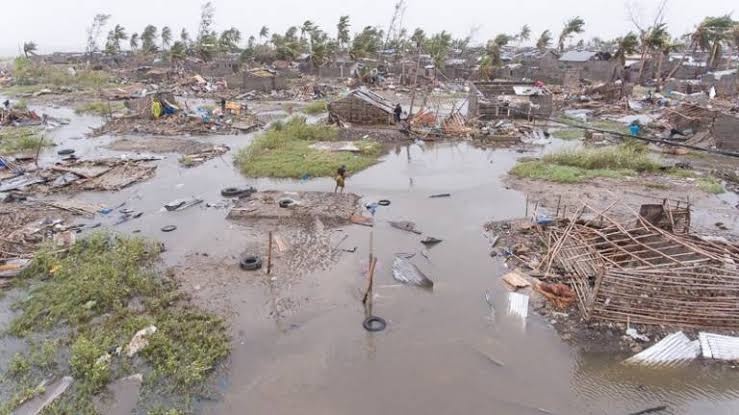Recurring Floods Have Damaged Health And Water Facilities In Mozambique – ICRC
The International Committee of the Red Cross revealed that with floods and cyclones damaging health and water facilities, groups of displaced people are exposed to several diseases associated with the lack of hygiene.

The International Committee of the Red Cross (ICRC) has said recurring and more frequent cyclones and floods have damaged health and water facilities in Cabo Delgado, Mozambique’s Northern province.
As a result, the organisation stated, a concerning shortage of safe water, sanitation, and health services is a looming threat to public health for displaced people and host communities.
Dominik Stillhart, Director of Operations for the ICRC stated in his three-day visit to Cabo Delgado warning that people depend on water and this is definitely not to any standards of public health.
“I think it is very important to pay very serious attention to what is happening here, especially in the North of Mozambique.”
During his visit, the Director noted that the lack of functioning health facilities reduced the capacity of the health system to detect and respond to disease outbreaks.
He further stated that the fragile state of health infrastructure has weakened as a result of armed conflict.
“80 per cent of health centres in the nine most conflict-affected Northern districts of Cabo Delgado are not functioning, even as the demand for health services increased by 20 per cent to 30 per cent in Southern areas of Cabo Delgado province, where displaced people are received,” he said.
“The overstretched health facilities have been struggling with the shortage of space, overcrowding, and lack of staff and medical supplies.”
According to him, Mozambique has been facing the impact of armed conflict and climate change in recent years, which has taken a toll on people’s health.
He added that more than 800,000 people, one-third of the province’s entire population, have fled their homes due to the escalation of the armed conflict, making displaced people settle in city outskirts, outside the coverage of water distribution system.
Due to the rapid population displacement, he said, “limited access to safe water sources in precarious settlements led to the rise of waterborne diseases like cholera and diarrhea.
According to WHO, the number of cholera cases in Cabo Delgado at the beginning of August 2021 was 3,400, compared to approximately 2,200 from the same period last year.
Also, in the first semester of 2021, 28,602 cases of diarrhea have been registered in the province, of which 40 per cent of cases were registered in districts where ICRC has focused its work, such as Montepuez and Ibo islands.
The ICRC marked that diarrhea has become the second cause of death among children under the age of five. COVID represents an additional risk, partially associated with the lack of hygiene.
However, ICRC added they are working with local authorities to rehabilitate the existing water and health infrastructures, as well as build new ones, to improve access to health and clean water and prevent the spread of deadly diseases.
The humanitarian organisation stated they are constructing a new hospital on Ibo, which will serve the entire 30-island archipelago coastal areas, stating that Mozambique is vulnerable to climate shocks.
“All of ICRC’s new rehabilitation and construction projects are built with resilient infrastructure to prevent as much as possible potential damage by natural catastrophe,” ICRC concluded.
Support Our Journalism
There are millions of ordinary people affected by conflict in Africa whose stories are missing in the mainstream media. HumAngle is determined to tell those challenging and under-reported stories, hoping that the people impacted by these conflicts will find the safety and security they deserve.
To ensure that we continue to provide public service coverage, we have a small favour to ask you. We want you to be part of our journalistic endeavour by contributing a token to us.
Your donation will further promote a robust, free, and independent media.
Donate HereStay Closer To The Stories That Matter




